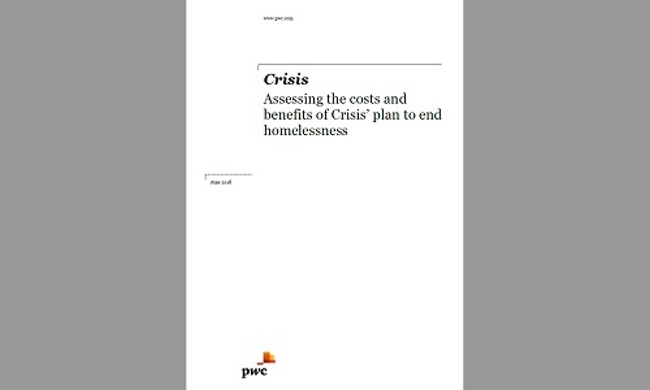Assessing the costs and benefits of Crisis’ plan to end homelessness
10.06.2018
In February 2018, Crisis commissioned PricewaterhouseCoopers LLP (“PwC”) to estimate the expected costs and benefits of achieving its plan through the different combinations of interventions (solutions) which Crisis has identified are necessary to address and prevent homelessness. This report focuses on the expected economic costs and benefits of Crisis’ recommended solutions to move people directly out of homelessness.
Key findings
- Overall, PwC have estimated that the total discounted costs of the solutions recommended to achieve our definition of ending homelessness between 2018 and 2041 is £19,289m, at 2017 prices.
- Over 90 per cent of the costs are expected to be incurred in England, with Greater London accounting for more than half of these. Scotland accounts for five per cent of the cost and Wales three per cent. This reflects the number of households and people projected to be homeless (core and wider) in each region between 2018 and 2041.
- More than half (£9,938m, or 52%) of the total discounted costs are expected to occur between 2018 and 2027.
- PwC’s analysis also estimates that between 2018 and 2041 solutions included in the analysis will deliver discounted benefits of £53,908m at 2017 prices. Nearly half (£26,426m, or 49%) of the total discounted benefits are expected to occur between 2018 and 2027.
- Nearly half of the estimated benefits accrue to local authorities over the period 2018 to 2041. They save £26,417m through reduced or avoided use of homeless services (e.g. reduced need for spending on temporary accommodation and other housing and support based services for homeless people funded by local authorities).
- Improved wellbeing as a result of people obtaining secure housing accounts for 27 per cent of the projected benefits (£14,646m), while increased economic output as a result of people entering employment (an estimate of their increased earnings) accounts for 12 per cent (£6,483m) of the total estimated benefits.
- Outside of local authority budgets, the Exchequer is projected to save around £6,361m (12%) through reduced use of public services such as NHS and criminal justice system services as previously homeless people are moved out of homelessness and, on average, are expected to use these services with a lower frequency.
- In summary, in present value terms, for every £1 that will be invested in the solutions recommended to move people directly out of homelessness, it is estimated that £2.80 will be generated in benefits – this includes cashable savings and wellbeing value.
Reference
PricewaterhouseCoopers LLP (2018) Assessing the costs and benefits of Crisis’ plan to end homelessness. London: PwC.

